- You are here:
- Home »
- Blog »
- Risks of freediving »
- 18 Common Freediving Injuries (anything passed #13 can be deadly)
18 Common Freediving Injuries (anything passed #13 can be deadly)
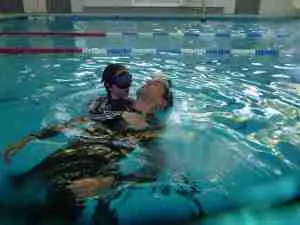
When you fully immerse yourself into freediving, you begin to notice the wonderful ways in which it enriches your life. All too often, new freedivers find themselves becoming healthier, fitter, calmer and all-round more confident people all because of freediving.
With a sport that carries such a wide range of cross-benefits into your life, it can get quite easy to overlook the dark side of freediving: the all too common freediving injuries that plague divers world wide.
What are these common freediving injuries? Let’s take a look below.
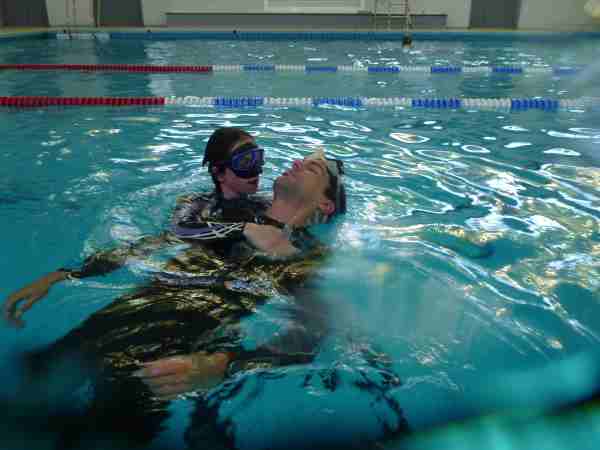
18 common freediving injuries – how many near misses have you had?
Most common freediving injuries you might encounter as a freediver.
Below, I’ve listed the most common freediving injuries. The list starts from most common and works its way down to least common freediving injuries. As you go down the list, you’ll notice not only do the injuries get less common, but they also become more severe.
One thing to keep in mind, is that your personal circumstances and how committed you are to following freediving safety rules, greatly impacts both how common and severe each injury listed below is.
Lastly, the information listed below is not certified medical or first aid advice. It’s written based on my opinion and experience. You’re always better off seeing a doctor or medical health professional if you’d like to treat and prevent these injuries as safely as possible.
With that out of the way; let’s get into our list of most common freediving injuries:
Sun Burn
It only takes a couple meters of water to filter out most of the ultra-violet light that causes sunburn. For this reason, it’s quite difficult for freedivers to get burnt during the actual dive/descent process.
Despite this, sun burn when freediving is still a very common freediving injury.
How? Well, most of the time when divers get burnt, it’s from when they’re on the surface or out of the water. Time spent doing breathe-ups, watching fellow divers from the surface or from the freediving buoy, or time spent on the deck of the boat, all contribute to sun burn when freediving.
My best tip to avoid sun burn when freediving: Here in Australia, they have a saying during summer time – “When the sun is out – Slip, Slop, Slap”.
‘Slip’ on any protective clothing to cover bare skin (where possible) from sun rays. Freediving hoods can be great for protecting your neck from harsh sun rays (while keeping you warm in the water).
‘Slop’ on some sunscreen to help block against UV radiation.
‘Slap’ on a hat (when on the boat deck of course, not when you’re diving!).
On top of that I’d also add to find shelter or shade from the sun whenever possible (like on the deck of the boat).
Also, keep in mind that just because clouds are out – that doesn’t mean you can’t get burnt. UV rays from the sun can still easily penetrate through clouds and burn your skin.
So remember Slip, Slap, Slop!
My best tip to treat sun burn when freediving: Try to stay out of the sun and drink plenty of fluids. Once dry and out of the water, apply some aloe vera gel to help sooth and moisturize your sun burn.

Don’t be fooled by cloudy skies! You’re better off slopping on a quick layer of sunscreen before your dive.
Dehydration
Most freedivers and spearos tend to dive in the open ocean/sea. This means you’re constantly battling sun rays and dealing with massive amounts of salt entering your system.
On top of that, you’re most likely burning through your body’s water reserves from all your physical exertion diving. When you’re ruthlessly focused on hitting that new depth, consumed by the peace and quite of the underwater realm or relentlessly chasing that elusive trophy fish…
You often forget to take time out to refuel and take a couple mouthfuls of water to replenish and re-hydrate.
My best tip to avoid dehydration when freediving: Plan out and set aside time during your surface intervals or after a certain amount of dives to drink water. You may want to invest in a nice thermo water bottle, so your water doesn’t get too hot to drink from laying in the sun all day.
You might even need to set a timer on your dive watch to remind you to rehydrate. Just like how elite athletes such as tennis players and football players sip on water throughout their matches…so too must you when freediving.
It doesn’t have to be a lot of water either. Just a couple mouthfuls here and there. This will go a long way to prevent dehydration and the nasty side effects associated with it.
My best tip to treat dehydration if you get it when freediving: is…you guessed it – to drink plenty of water!
Blisters
The most common place you’ll get blisters when freediving, is on your feet. And in almost all cases, the blisters are from the skin on your feet being rubbed raw against your fins.
Less common places to get blisters include your nipples, groin and just above your arm pits. Usually this comes from friction caused by your wetsuit against your skin.
My best tip to prevent blisters when freediving: depends on where the blisters are.
If they’re on your feet, they’re being caused by your fins. The best solution here is to wear neoprene socks to decrease the friction of your fins rubbing against your feet.
Already have neoprene socks but still getting blisters from your fins? Check out this post I wrote here exploring 10 other things possibly causing the blisters on your feet when freediving.
If your blisters aren’t on your feet; they are most likely being caused by your wet suit not fitting properly or just too much friction combined with salt drying your skin out. My recommendation is to double check your wetsuit fits properly, and to apply a gentle wet-suit and waterproof friendly lubricant like Body Glide.
My best tip to treat blisters if you get them: Apply a nice lubricant like Vaseline to the blister to lower the friction and subsequent burn.
Hypoxia
As a freediver, you spend a lot of your time under water holding your breath. Holding your breath causes the tissues in your body to become starved of much needed oxygen. When the oxygen supply in your body tissues drops to a critically low point, your body will start to show symptoms of hypoxia.
Common signs of minor hypoxia (which is fairly common in freediving) include: general confusion, numbness, minor loss of motor control and a slight blue tinge to the skin.
In severe cases of hypoxia, the tissues in your body will shut down and you will lose consciousness. However in the case of hypoxia caused by freediving, I’d say the latter ‘severe’ cases of hypoxia is actually very rare.
My best tip to prevent hypoxia when freediving: is to never push your limits too hard when freediving. For a lot of you reading this, freediving is about testing your mental and physical fortitude to see how deep you can go. I get that. I’m not advising against challenging yourself.
But to safeguard against hypoxia (and even more severe injuries), you should always sensibly and carefully descend passed your PB depths. Don’t rush things by descending too far down too early.
My best tip to treat hypoxia if you get it when freediving: is to resume calm, normal breathing at surface level to remove the symptoms of minor hypoxia. I have no experience with severe hypoxia or hypoxia with complications, but I’d recommend going to the hospital where they may give first aid oxygen or pure oxygen.
Anxiety
I’ve included anxiety in this list because, although it technically isn’t really an injury, it is a common side affect of freediving and can lead to injury – especially in newer divers.
Feeling anxious – or overly worried/stressed – can feel quite horrible. Common symptoms include a raised heartbeat, tightness in your chest and throat and a flood of negative thoughts. The worst thing about anxiety in freediving is that it causes your body to use more oxygen resulting in shorter dives. Because of this many freedivers become anxious about…being anxious, resulting in a viscous cycle that can completely ruin your freediving experience.
My best tip to prevent & treat anxiety when freediving: is firstly, to start meditating regularly. Meditation is difficult and hard to get into. But I promise that if you stick with it and learn how to do it properly, you really do feel much more relaxed and calm and you won’t stress so much during your dives.
Alternatively, you can listen to relaxing audio before you dive. Some music and audio tapes are able to get your brain to ‘switch gears’ to a more relaxed state.
Secondly, to treat anxiety when freediving, focus on controlling your thoughts. When you’re in a high-pressure situation, like ascending from a deep dive without much oxygen left – it can be easy for your mind to spiral out of control and spit out waves of negative thoughts.
Instead, try to stay positive. When you feel anxious, observe the situation objectively. See it for what it is, then do your best to solve it and get out of it – all the while reminding yourself of all the times you’ve gotten to the surface safely. Visualize coming back up safely. Don’t freak out and jump to conclusions just because you’re under pressure and feeling anxious.
Third, remember that lack of experience and thus lack of confidence are usually what create anxiety as a freediver. As you gain more confidence in the water and start to see that you really can thrive in difficult freediving situations, your anxiety will diminish.
Remember: all freedivers feel anxious in the water at some point in their diving careers. It’s nothing to freak out about and certainly isn’t unnatural.
Lacerations, minor cuts
Very occasionally, stray rubbish, debris or coral floating in the water may cut you or penetrate your skin. This is very unlikely if you’re simply freediving up and down. But if you’re a spearfisher and you’re chasing fish and ducking in and out of rocks and coral, you may scrap yourself here and there.
Also, fishing nets, ropes and lines can sometimes cause cuts or make for unexpected entanglements.
My best tip to prevent cuts and lacerations when freediving: If you freedive with your eyes open (you are wearing a mask aren’t you??); keep an eye out for anything in your environment that looks a little odd. If you’re a spearfisher, remember to take it easy! Chase that fish but be careful – it ain’t the end of the world if it gets away!
My best tip to treat cuts and stop yourself getting entangled when freediving:
If you cut yourself – apply something like Betadine when dry. Then apply a band-aid. Also, if you don’t have a first aid kit – get one here – better to be safe than sorry!
And in the unlikely case you become entangled in something underwater – you should have a small diving knife strapped to your arm or leg when freediving. This can help massively in case you become trapped in something and drown (very unlikely but worth noting!).
Heat Stroke
Heat stroke is caused by a combination of loss of fluids (dehydration) and body temperature rising too high from excessive sun exposure.
If your body temperature raises above 40.5 degrees celsius, there’s a good chance some of your internal organs like your kidneys, liver etc will start to shut down.
Typically when you’re in the water diving, you shouldn’t have to worry about heat stroke. The cold ocean water mixed with a nice cool breeze should be enough to keep your body temperature normal. Just make sure you stay hydrated while freediving.
The real risk of heat stroke comes when you’re out of the water and in the sun and you start to over heat.
My best tip to prevent heat stroke when freediving: Is if you’re on the deck of your boat waiting to dive; stay hydrated, stay in the shade and wear sunscreen. Regularly cool your body down by jumping in the water if need be.
My best tip to treat heat stroke if you get it when freediving: If you do think you might be getting some of the symptoms of heat stroke – muscles feeling weak, dizziness and a head ache – let your diving buddies know and cancel your diving for the day. Then drink plenty of fluids and cool your body down with water and lay in the shade. Diving with heat stroke is very dangerous as it will only make you weaker and boost your chances of blacking out underwater.
If someone you’re diving with does get heat stroke and loses consciousness because of it – bring them to a cool shady area, apply first aid and keep them wet to cool them down. When unconscious, do not give them water as they won’t be able to swallow it. While doing all of the following, the person should be rushed to hospital.
Hypothermia
Hypothermia is pretty much the opposite of heat stroke. Hypothermia happens when your body temperature drops below 35 degrees celsius. When this happens, your body isn’t able to work properly anymore, and much like heat stroke, organs like your heart and lungs start to shut down.
Getting hypothermia as a freediver is quite rare. However, for Europeans and Canadians reading this, it may apply for your winter dives in cold and near freezing waters. It’s important to note that hypothermia isn’t just a risk when in cold water. After diving, when you’re wet and returning to land, you’re still at risk – especially if there are strong winds.
My best tip to prevent hypothermia when freediving: Is to wear thick neoprene socks (3-5mm+), and a good wet suit that keeps you warm. Additionally, invest in some gloves.
When you’re diving in cold water, keep moving and keep wiggling your toes and fingers so warm blood keeps them from freezing off! If the water looks or feels too cold to comfortably dive in – don’t do it. You’re only shouldering more risk and diving in icy waters may cause anxiety when diving.
My best tip to treat hypothermia when freediving: If one of your diving buddies appears unconscious, incredibly cold to touch and unresponsive – they could have hypothermia. If that’s the case, apply first aid and take them to a hospital immediately while warming them down.
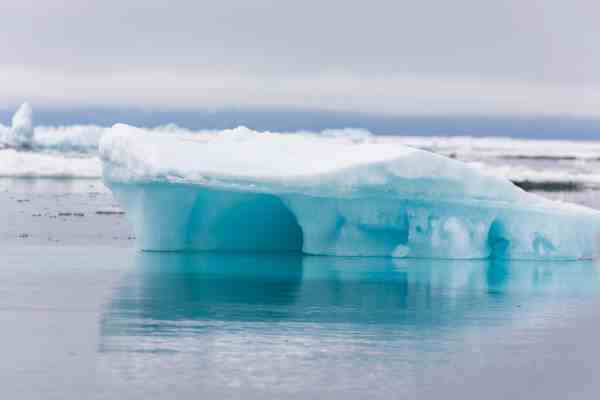
Still keen for a dip? 😉
Stings, bites and bumps
One of the biggest beauties of freediving, is that you can plunge into the water and almost instantly be surrounded by natural marine life. You get an up-close and personal view of the underwater world in the most natural way possible – and without noisy, clunky scuba gear interfering!
But sometimes encounters with marine life can get a little too ‘up close and personal’. When this happens you risk getting stung, bitten or worse. There are hundreds of thousands of underwater animals and many of them can pack pretty painful stings and bites.
My best tip to prevent stings, bites and bumps when freediving: Wear gloves, wetsuits and neoprene diving socks/booties. Cover up as much skin as possible. Not only will this keep you warm, but it will also protect against smaller animals.
When it comes to big predators like sharks – try to freedive in groups. It’s incredibly rare for sharks to attack freedivers. But if you think they’re a threat – dive with some other buddies to scare them off – or just don’t dive at all for the day.
Overall, it’s very rare to actually get injured by an animal when diving, unless you’re doing something stupid like touching them!
My best tip to treat stings, bites, bumps if you get them when freediving: This is a broad topic and something I don’t have much experience in (thankfully!).
If the sting is from something like just a normal jelly fish – simply wash the area with salt water and use tweezers to remove the tentacle pieces. You may end up with a slight rash or blister, nothing too serious.
If something like a stingray stings you or a shark attacks you…you should head to the hospital immediately.
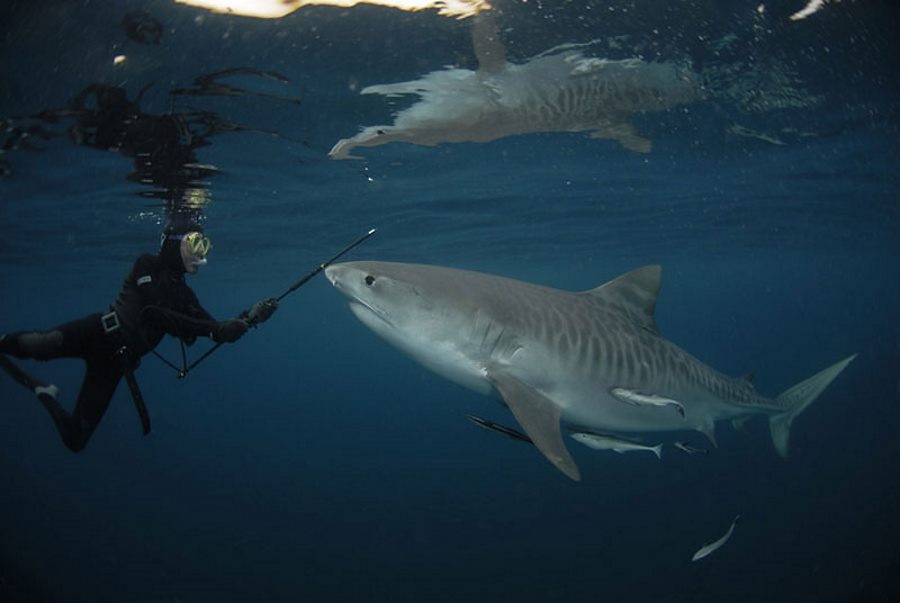
Exhaustion
Exhaustion – or using all your energy reserves – can be lethal when freediving. If you’re bent on breaking your own PB depth and have been trying all day but just can’t seem to crack it – then you may push yourself to the point of exhaustion out of sheer frustration and persistence.
This is a particular concern for spearfishers. Although you guys and gals may not dive deep when spearing, often the thrill of catching something can push you in and out of the water over and over again. This can push you to the point of exhaustion if you’re not careful – and in severe cases can lead to drowning.
early warning signs of exhaustion include: slowing down of muscle movements, feeling weak and drained, becoming forgetful and slower thinking processes/confusion.
My best tip to prevent exhaustion when freediving: Make sure you maintain a proper diet before diving. Pace yourself by not pushing things too far. Also, avoid diving in strong currents as they will wear you out.
To expand on this: powerful, unexpected currents, rips and tides account for a huge amount of drownings all over the world.
Typically, rips are seen as the most dangerous. Rips are incredibly strong currents and can drag you away from the shore into deeper waters. If you find yourself in a rip; swim parallel to it (so at a right angle from where it’s pushing you to). Do this until you’re out of it. Do not try to swim against a rip, as you will tire yourself out and possibly drown.
Checking for rips can be hard, but some warning signs are:
- Constant breaks and smashing of waves.
- Huge amounts of foam and/or floating debris.
- Water that’s cloudier or harder to see through than the rest.
My best tip to treat exhaustion from freediving: Is if you find yourself getting exhausted when freediving, stop immediately. Whatever record you’re trying to break or fish you’re trying to catch can wait. Your health and well-being is more important. If you’re feeling exhausted, head back to shore or the deck of your boat.
Medium to light bruising
If you’re going cave, cavern or wreck diving, you may end up with some light bruising from hitting your body parts on obstacles in tight spaces. Also, spearos caught on the thrill of the chase may end up with light scrapes and bruises against rocks when trying to spear that fish. usually none of these bruises are anything to worry about but should still be avoided.
The real danger is when you’re freediving in poor weather with low visibility. When you and others can’t see properly, you risk anonymous boats hitting you when you’re on the surface.
If a boat is travelling fast enough and it slams into your head – you won’t simply have a bruise. The boat could easily kill you by causing a fatal concussion or worse.
My best tip to prevent bruising when freediving: Is to be careful when diving in confined spaces (eg wrecks, caves etc).
To stop the threat of boats hitting you, make sure you’re aware of your surroundings. Avoid highly populated boating areas and mark your diving site with a flag and diving buoy.
My best tip to treat bruising if you get it when freediving: Apply a cold compress after the injury. Something like an ice pack wrapped in a tea towel should do the job fine, to reduce swelling & bruising.
If you’re in a more serious situation like when a boat has hit one of your buddies in the head – bring them to dry land immediately. Apply first aid where necessary and take them to hospital.
Nitrogen narcosis
The deeper you dive, the more the nitrogen levels in your lungs & blood rises.
When the nitrogen concentration in your blood rises to a certain amount; you can be affected by nitrogen narcosis.
The effects of nitrogen narcosis changes between everyone. Most people say it’s a lot like being drunk, while also feeling slightly numb and mentally confused. Others report strong hallucinations. In rare cases, nitrogen narcosis can be deadly. Especially if you hallucinate so much you lose your sense of direction or get distracted and forget to resurface.
My best tip to prevent nitrogen narcosis: is to avoid diving too many times per day. Also, try not to dive too deep, too quickly. Deep diving takes time, skill and experience to master.
My best tip to treat nitrogen narcosis if you get it when diving: If you start to feel the effects of narcosis, ascend. Moving up toward the surface will decrease the amount of nitrogen dissolved in your blood, which means you won’t feel the effects as strongly.
Injuries due to pressure (barotraumas)
There is an entire laundry list of barotrauma-related injuries freedivers can get. These range from ear squeeze, to trachea squeeze and even mask squeeze.
The underlying cause with all pressure-related injuries is the same…The increase of water pressure from diving deeply, decreases air volume in certain organs (such as lungs, ears, neck etc). When this happens – and no air is put in to counteract the sudden shrink in volume – ruptures and/or fluid leakages in organs occur.
Common examples in the world of freediving are things like lung squeeze or ruptured ear drums.
My best tip to prevent pressure related injuries happening to you: Is to remember to equalize frequently. Also, train carefully. Don’t make sudden rapid turning movements at great depths or descend to depths you are uncomfortable with. Never dive if recovering from an injury. Also, there are many dry land activities you can do to strengthen and protect yourself against barotrauma injuries, like reverse lung packing.
My best tip to treat barotraumas from freediving: Depending on the injury type, you may need to see a doctor. If it’s something like coughing up a little blood from mild lung squeeze; you may not need medical attention. That’s usually just a warning sign you went too deep or were unprepared for your depth in some way. Use that as feedback to better your dives.
But if it’s something serious eg: a ruptured ear drum – go see a doctor immediately.
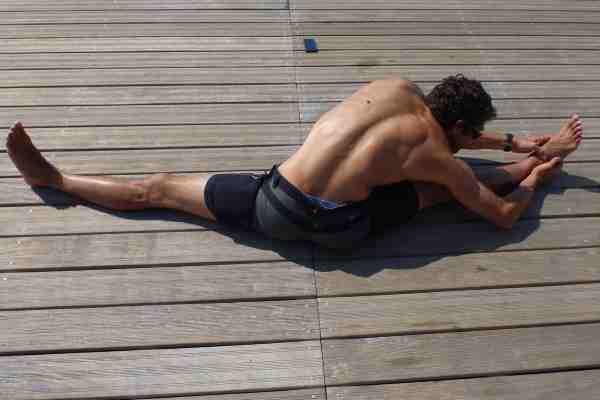
Dry land exercises like yoga and reverse lung packing can help your body deal with the effects of pressure at depth
Surface blackout
This is a type of blackout that only happens above the water after a breath-hold dive.
Surface water blackout happens when the air you inhale after resurfacing takes too long to reach your brain, so you pass out.
No matter whether it’s surface water blackout, ascent blackout or shallow water blackout…all blackouts look the same. Deeper Blue has a great post on how to spot and treat freediver blackouts.
Quoted below from their site is how to spot blackouts:
The diver stops swimming for no apparent reason
The divers legs become slack
The divers arms may fall down to the sides of their body
The divers eyes may roll back or close as they become unconscious
Their head may roll forward or drop down onto their chest
The diver will begin sinking
A convulsive twitching or spasming may occur
My best tip for preventing surface water blackouts: Is – well – there’s actually two tips I have here. First, to stop surface blackouts, you should dive for a shorter amount of time, until you’re certain you can handle a deeper depth. The more you freedive, the better you’ll get at knowing your own limits.
Second, to stop surface water blackouts, start hook breathing when resurfacing. Long story short, hook breathing pushes newly inhaled air toward your brain at a faster pace than normal. This can stop you from blacking out. I’ve written a relevant post here that explains how hook breathing works.
Also, remember to keep an eye on freedivers for several minutes even after they signal they are okay. Freedivers can still pass out several minutes after resurfacing.
My best tip to treat surface water blackout: Is to follow regular emergency first aid procedures for a diver who is unconscious.
This includes bringing them to dry land, while supporting their head and sealing their airway to prevent water leaking in. If the diver does not regain consciousness, check their airway is clear of water, get help from bystanders and commence CPR/first aid.
Ascent Blackout
Ascent blackout is sometimes known as deep water blackout or shallow water blackout. In this particular case, I’m going to draw a line between ascent blackout and shallow water blackout (covered later), and treat them as two different things.
Ascent blackout is a loss of consciousness that happens in the last 5 – 10 meters (~15 to 30 feet) when ascending from a deep breath-hold dive.
How it works is fairly simple: when you’re deep under water; you’re under an immense amount of water pressure. This huge piling of water on top of your body, boosts the air and oxygen pressure in your lungs.
When you ascend – especially in the last 10 meters of your dive – the water pressure eases off, lowering the oxygen pressure in your lungs. This rapid depressurization drops the partial pressure of oxygen in your lungs, which is very alarming to your brain.
In order to cope with the rapid depressurization, your brain and body goes unconscious, leading to ascent blackout.
The best way to treat and prevent ascent blackout, is the same as with surface water blackout – don’t dive too deep and train your body to operate like an efficient machine when on low oxygen.
Shallow Water Blackout
There is quite some debate among freedivers, lifeguards and medical professionals as to what exactly shallow water blackout refers to.
For the sake of this article, shallow water blackout means to lose consciousness underwater due to hyperventilation.
How it works:
When you inhale air, your body metabolizes the oxygen in your lungs and produces carbon dioxide as waste.
Your body then detects the rising levels of carbon dioxide in your blood (not the lowered levels of oxygen) – and this is what gives you the urge to breathe or inhale air.
Once you breathe, fresh oxygen rushes into your lungs and reaches you brain, keeping you conscious and alive.
So the important take away here is that: the only reason you feel like breathing, is because of the carbon dioxide build up in your blood reminds you to breathe. Carbon dioxide buildup is what keeps you alive, and triggers your next breath.
But when you hyperventilate:
You expel and flush out more carbon dioxide from your bloodstream than is normal and natural.
This then artificially lowers carbon dioxide levels in your blood, tricking your body to think it has more oxygen left than it really does.
This can result in you ‘blacking out’ from lack of oxygen to the brain, because your carbon dioxide levels are not high enough to trigger your need to breathe.
In short: Hyperventilating dulls your ability to know when you are in danger of losing consciousness from lack of oxygen. This is what causes shallow water blackout in freedivers.
It is strongly recommended to never hyperventilate before freediving. It is dangerous and not necessary to reach massive depths or experience the sport fully. Hyperventilation is the number one cause of shallow water blackout and of drownings.
Decompression sickness (also known as Taravana)
Decompression sickness can affect freedivers, although it is incredibly rare.
In a nutshell, decompression sickness occurs when rapid pressure changes causes nitrogen to bubble in the blood. Common diving activities that cause nitrogen to bubble in the blood include ascending too quickly and/or doing to many dives in one day.
Decompression sickness can cause fatigue, pain in your joints and nausea. In extreme cases; decompression sickness can cause paralysis or even death.
There isn’t a great deal of research on how to prevent decompression sickness as a freediver, simply because it is so rare.
However it’s commonly said decompression sickness is avoidable as a freediver by not doing too many dives in one day. Also, you should allow ample rest on the surface between each dive. It’s worth noting that as a general rule of thumb for freediving; Dive Wise recommends your surface interval between each dive be twice as long as each dive.
So if you dive for 1 minute, you have to wait 2 minutes on the surface before diving again.
My best tip to prevent decompression sickness: don’t spend all day diving as deep as possible to the point of exhaustion. Allow for good chunks of rest in between dives. Listen to your body and use common sense.
My best tip to treat decompression sickness if you get it when freediving: I’ve personally never had to deal with this before. However, the general guidelines for treating decompression sickness is to stop diving immediately and go to the hospital straight away. If possible, get the diver to breath pure oxygen to counteract the nitrogen saturation in their blood. Some hospitals contain decompression tanks, which can help also.
Brain Damage
Brain damage from freediving is a highly disputed topic among the few researchers who do study freedivers.
The overall conclusion is that you probably don’t get brain damage from holding your breath when diving as long as you don’t pass out underwater.
Holding your breath in a day-to-day basis doesn’t kill brain cells. Freediving underwater probably doesn’t kill brain cells. It’s only really said to be a risk if you starve your brain of oxygen to the point where you lose consciousness and inhale water and begin drowning. By that point, some of your brain may shut down and get damaged.
How long can your brain go without oxygen before it starts to get damaged?
For the average person this takes about 4 – 5 minutes. However, this is a complex topic so, if you’d like to discover more about it – I’ve written an entire post on brain damage from freediving. You can read it by clicking this link here.
Common freediving injuries: final thoughts
As a freediver; the most common injuries you’ll get, are the minor ones like sunburn and blisters. Luckily, these aren’t very serious and are often incredibly easy to treat.
But when it comes to injuries like severe barotraumas, underwater blackouts and decompression sickness – you need to pay close attention and behave safely at all times.
The underwater realm may carry a beautiful, almost mystifying stillness and serenity about it…but it can also be deadly. As I’ve listed many times before in this post; the best way to safeguard against the more dangerous injures, is to pace yourself and never let your ego get in the way of following sensible freediving safety rules.
About the Author Gerrie van Niekerk - Apnealogy
Gerrie is a passionate Freediver, Spearfisher, Digital Marketer, and author for the Apnealogy website. Gerrie is an SSI Level 1 certified Freediver who loves geeking out about freediving and spearfishing gear and lives for his family and adventure.


